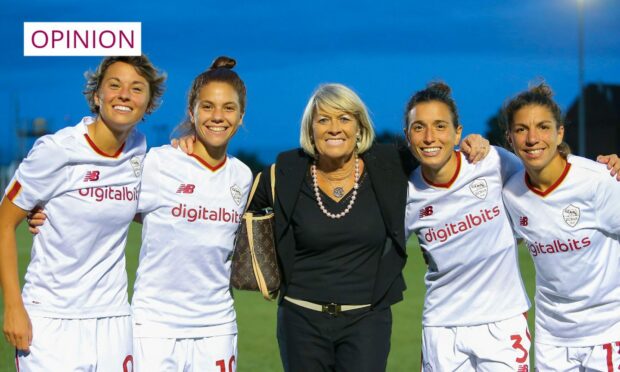Football has a problem with women. Football has a problem with women’s success. There, I’ve said it.
In the last few weeks, we’ve witnessed Luis Rubiales, president of the Royal Spanish Football Federation, assault the World Cup-winning Spanish midfielder Jenni Hermoso by grabbing her and forcibly kissing her on the mouth. This happened live on TV, but Rubiales has subsequently attempted to gaslight us all into believing it wasn’t assault, it was perfectly normal behaviour, just a friendly “celebratory kiss”.
We’ve also watched in horror the appalling spectacle unfold at Manchester United, as the Premier League club has attempted to protect striker Mason Greenwood.
Greenwood was charged in October 2022 with attempted rape, controlling and coercive behaviour and assault occasioning actual bodily harm. Although it was widely reported on social media that Greenwood was cleared, the case was in fact dropped due to the key witness withdrawing. There was clear audio evidence supporting the case. (All survivors and campaigners know fine well why women withdraw from devastating rape and domestic abuse trials, not least because of the control of abusers and the abject failures of the criminal justice system to convict.)
Manchester United tried to pull the wool over our eyes. The club said Greenwood had gone, perhaps in response to the huge public outcry but, in fact, he’s only gone on loan for a year, to the Spanish team Getafe. Manchester United is still propping up his exorbitant wages. His new loan club is said to be easing his transition by renting a villa at £8,000 a month, to help him settle in, as well as paying for a “cultural coach”. He needs a different kind of coaching, in my opinion.
This seems to be a template for how abusive men are treated in professional football. A quick peruse of X (formerly Twitter) posts on the matter shows just how many Manchester United supporters back Greenwood and welcome his return. Many of the comments are vile.
The club has done itself no PR favours in treating domestic abuse charities as hostile, particularly given that there is a well-documented rise in violence against women that accompanies men’s football matches. Research shows that an increase in men’s violence occurs regardless of whether their team wins or not.
Scotland punished Rose Reilly for her greatness
When I was a wee girl, growing up in Ayrshire, my footballing shero was Rose Reilly, who was born in Kilmarnock and lived in the small town of Stewarton, just a few miles up the road from me. We talked a lot about Rose in my family, as both my sister and my father were accomplished footballers.
I learned that Rose had to masquerade as a boy so she could play for her local team, cutting off her hair and calling herself Ross. As a teenager, she was forced to leave Scotland due to the sexism she encountered, and lack of any opportunity for women players.
Rose moved to Italy, winning two Serie A titles with Milan, and playing for nine Italian clubs over 20 years. She won the treasured Golden Boot in 1978, scoring an amazing 43 goals for Catania, and in 1981, hitting 45 for Lecce.
In an astonishingly brutal response to her success, the Scottish Women’s Football Association issued Rose with a lifetime ban from playing for Scotland. Rose lifted the World Cup as captain of Italy in 1984. Her story was my first, tender-aged lesson in institutional misogyny within the football world.
Activism and optimism
However, I’m an activist and an optimist, so I’m ending this column on a positive note, remembering another victory, one which I thought about a lot this week. That victory was the response of the Scottish club McDermid Ladies FC to misogyny in football. The women’s football team – formerly known as Raith Rovers – broke away from its original club last year after David Goodwillie, who a judge in a civil case ruled had raped a woman, was signed for the men’s side.
McDermid Ladies is named after Val McDermid, the author who moved her sponsorship to the new team in protest. Last year, McDermid Ladies was honoured by Scottish Women’s Football for refusing to accept poor decisions by its former club. Also present at the prize-giving ceremony was Rose Reilly, who now lives back in Scotland and is involved in community engagement with young people and in promoting women’s football.
Still spaces available for players to join the club for anyone wanting a new challenge or looking to get back into the game.
Get in touch for more details ⚽️🤍 pic.twitter.com/fSHjVcUu1L
— McDermid Ladies (@McDermidLadies) August 22, 2023
Just this week, Rose joined Celtic FC as an ambassador for the women’s team. She remains the only Scot to lift football’s greatest prize and hold a World Cup winner’s medal.
Rose Reilly’s story is a powerful antidote to the misogyny and machismo that pervades football. It’s our duty to back every wee girl who wants to follow in Rose’s footsteps, and to keep challenging the sexism which exists as an ugly, thorny poison within the beautiful game.
Donna McLean is originally from Ayrshire and is a mum of twins, writer and activist

